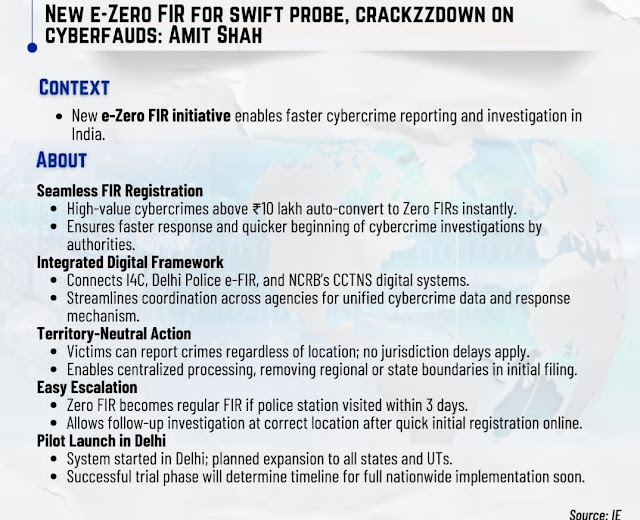Constitutional acts led in 2024
=>E-Zero FIR: The government has launched the e-Zero FIR system to fast-track high-value cybercrime investigations. Starting in Delhi, it auto-registers FIRs for frauds above ₹10 lakh. The concept of a zero FIR is relatively new and was introduced on the recommendation of the Justice Verma Committee in the aftermath of the Nirbhaya gang rape case in 2012 to put a legal obligation on police to take quick action and prevent them from using the excuse of absence of jurisdiction.
=>The New Lady Justice Statue is unveiled: The Supreme Court unveiled the new '
=>5 new classical languages have been approved by the cabinet:
The Union Cabinet has approved the recognition of five more languages as "classical," expanding the nation's list of culturally significant tongues.
- Other than 5 languages, Marathi, Pali, Prakrit, Assamese, &
- The 11 classical languages of India serve as custodians of the
- Indian classical languages (Shastriya Bhasha) are languages with a rich historical legacy, profound literary traditions, and distinctive cultural heritage.
=>Aparajita bill of West Bengal govt.:
Top 10 Key Points about Aparajita Bill
Here are 10 key points of the 'Aparajita' Bill, which aims to strengthen laws against rape and sexual offenses in West Bengal:
- Death Penalty: The Bill passed in the Assembly contains the death penalty for individuals convicted of rape in cases that the crime results in the death of the victim or a permanent vegetative state.
- Life Imprisonment: The bill also proposes life imprisonment for those accused of rape or gang rape. They will have to spend the rest of their lives in prison.
- Repeat Offenders: For repeat offenders, the punishment will be life imprisonment or, in severe cases, the death penalty. The individual can also be levied with a financial fine in certain situations.
- Amendments to BNS 2023: The Bill also proposes key changes to several sections of the Bharatiya Nyay Sanhita (BNS) 2023. The new bill focuses on stricter punishments for rape, gang rape, and related crimes in comparison to BNS.
- Omission of Certain Sections: The Aparajita Bill has certain sections related to the age of offenders removed. This step will streamline the legal process and put more emphasis on the seriousness of the crime.
- Speedy Investigations: The Bill mandates that investigations into rape cases must be completed within 21 days, with a possible extension of up to 15 days. The extension must be justified by a senior police officer.
- Special Task Force: A district-level 'Aparajita Task Force,' led by a Deputy Superintendent of Police, will be established. The task force will be dedicated to investigating rape and sexual offenses.
- Specialized and Fast-Track Courts: The Bill proposes the creation of 52 special courts to dedicatedly handle investigation teams and oversee cases of rape and sexual offenses against women and children efficiently.
- Privacy Protections: The Bill introduces penalties for unauthorized printing or publishing of court proceedings related to rape cases. The offenders of this rule will have to face 3 to 5 years in prison and fines.
- Victim-Centered Approach: The Bill aims to minimize the trauma experienced by victims and their families by ensuring swift justice and handling cases with sensitivity.
=>Hindu marriage invalid without customary rituals: SC Registration of a marriage under the Hindu Marriage Act, 1955 (HMA) will not confer any marital status to a couple unless their union is solemnised according to the rituals mentioned under the law, the Supreme Court has ruled.
=>Kovind committee submitted its report: on "one nation, one election" concept. The Committee held extensive consultations to understand the views of different stakeholders. 47 political parties submitted their views and suggestions, out of which 32 supported simultaneous elections. Many political parties had extensive discussions with the HLC on this matter. In response to a public notice published in newspapers in all the States and Union territories, 21,558 responses were received from citizens from all over India. 80 percent of the respondents supported simultaneous elections. Experts on law such as four former Chief Justices of India and twelve former Chief Justices of major High Courts, four former Chief Election Commissioners of India, eight State Election Commissioners, and the Chairman, Law Commission of India were invited by the Committee for interaction in person. Views of the Election Commission of India were also sought

=>Note for vote: SC rejected its own decision and ruled out that they would be prosecuted by the law, who found guilty for this cause.Supreme Court on Note for Vote Case: Today the Supreme Court has given a big decision on the case of 'Note for Vote'. In which case will be filed against the MLA-MP for giving a speech or voting in the House by taking money, they will not get legal immunity.
=>Supreme Court calls electoral bonds scheme unconstitutional:











.jpg)
No comments:
Post a Comment